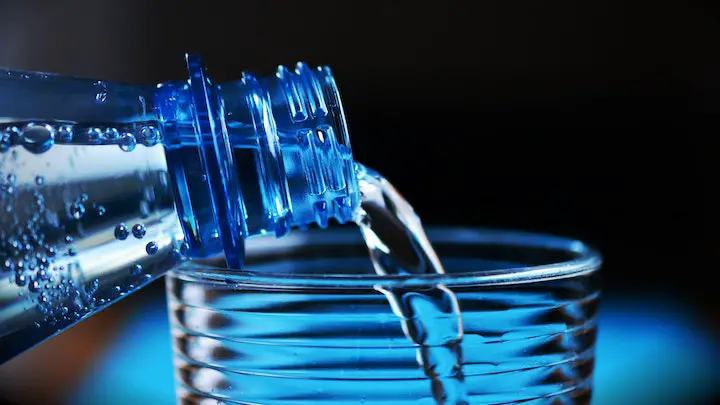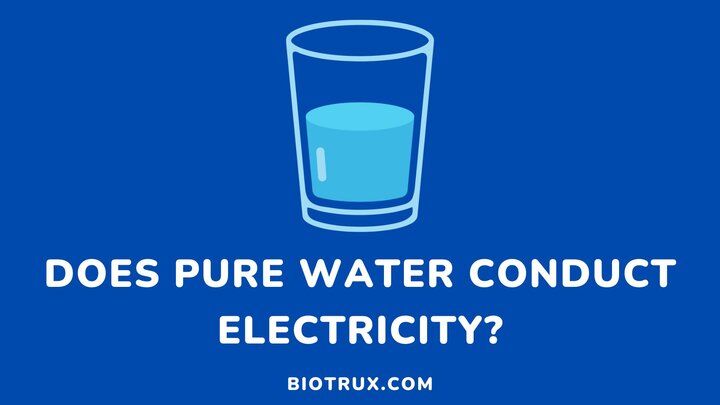Pure (or distilled) water does not conduct electricity because it lacks impurities and ideally repels or will not dissociate in the presence of an electric current.
Sea, tap water, and rainwater, on the other hand, contain impurities. Hence, they easily dissociate into highly mobile ions in the presence of electricity.
For conduction to take place in pure water, it must be exposed to impurities or other external factors. This way, when an electric potential (or source) is introduced, its molecules split into ions and allow for an electric influx.
In this guide, I will be explaining how pure water can become a conductor, its electrical and thermal conductivity, and real-life applications.
But first, let’s see some (general) physical and chemical properties of water.
Physical and Chemical Properties of Water
- Water is a colorless and odorless universal solvent.
- It has a bent molecular geometric structure and a hexagonal crystal structure
- The specific heat capacity of water is 4186 J/kg·K (1 cal/g·C)
- Water is amphoteric. This means it can act as an acid or base.
- The heat of vaporization of water is 2260 kJ/kg (540 cal/g)
- It has a heat of fusion of about 334 kJ/kg (80 cal/g)
- Water has a boiling point of 100℃ or 212℉
- Its melting point is rated at 0℃ or 32℉
- The density of water is 0.9998 g/cm³
How to Make Pure Water Conduct Electricity

Pure water will only become conductive upon exposure to impurities that are soluble in water such as salts, acids, or bases. These impurities will dissociate into positive and negative ions depending on the number of valence electrons lost or gained by the atom.
The formation of these ions releases ionization energy which allows chemical energy gets converted into electrical energy in the presence of a power source or electric potential.
These ions will eventually begin to flow towards negatively charged rods and result in conduction.
Electrical Resistivity of Pure water
Beyond super stable ions, pure water is also not a good conductor of electricity because it is in equilibrium with carbon dioxide present in the air. Thanks to this, it offers nothing (in terms of conductivity) but an electrical resistance of 0.05 µS/cm at 25°C.
When pure water has impurities, its conductivity increases. This is the case for:
- Drinking water – with a conductivity of about 200 to 800 µS/cm.
- Sea water – with a conductivity of 50 mS/cm
- Rain or snow water – with a conductivity of about 2 to 100 µS/cm
Uses of Pure Water
- Water plays a role in processing wood to make paper.
- It is used to produce steel for automobiles.
- The bulk of the world’s water helps in generating thermo-electric energy.
- To produce beers, drugs, and beverages, you also need pure water.
Does Pure Water Conduct Heat?
Thermal conductivity is the ability of heat to flow through any substance. Water (pure or not) is generally a poor conductor of heat. The thermal conductivity of water at 20°C is about 0.6W/mK.
Unlike other liquids, the thermal conductivity of water increases with temperature until it reaches a point close to its boiling point. At this point, conductivity begins to reduce with an increase in temperature.
FAQs
Can water conductivity be zero?
The conductivity of water can only be zero in pure or distilled water.
This is because they lack impurities like salt or acids.
What is the conductivity limit of purified water?
The conductivity limit of purified water should not exceed 2.1 μS/cm.
Any value above this limit only means the water is not entirely pure and may conduct.
Is high conductivity in water good?
High conductivity in water is not always good.
It means such water has impurities or minerals and may not be ideal for every user.
Conclusion
Pure water does not conduct electricity unless it is exposed to soluble impurities such as salts, acids, bases, or minerals. Hence, it is safe to say one of the easiest ways to confirm the purity of any water is to test it for conductivity.
Despite their poor electrical and thermal conductivity, they play a huge role in medicine and science. Pure water is the most suitable for laboratory testing and is essential for the production of medications and beverages.
Conducting water also has its uses. Salt water, for example, is a coolant for thermo-electric power plants and aids in body rehydration. Acidic water also can disinfect and bleach.
I hope you found this guide helpful. For relevant insights on how salt water conducts electricity, please see if salt is conductive.
Thanks for reading.

